IAEF: Highlights From The Just Concluded India-Africa Summit In Kenya
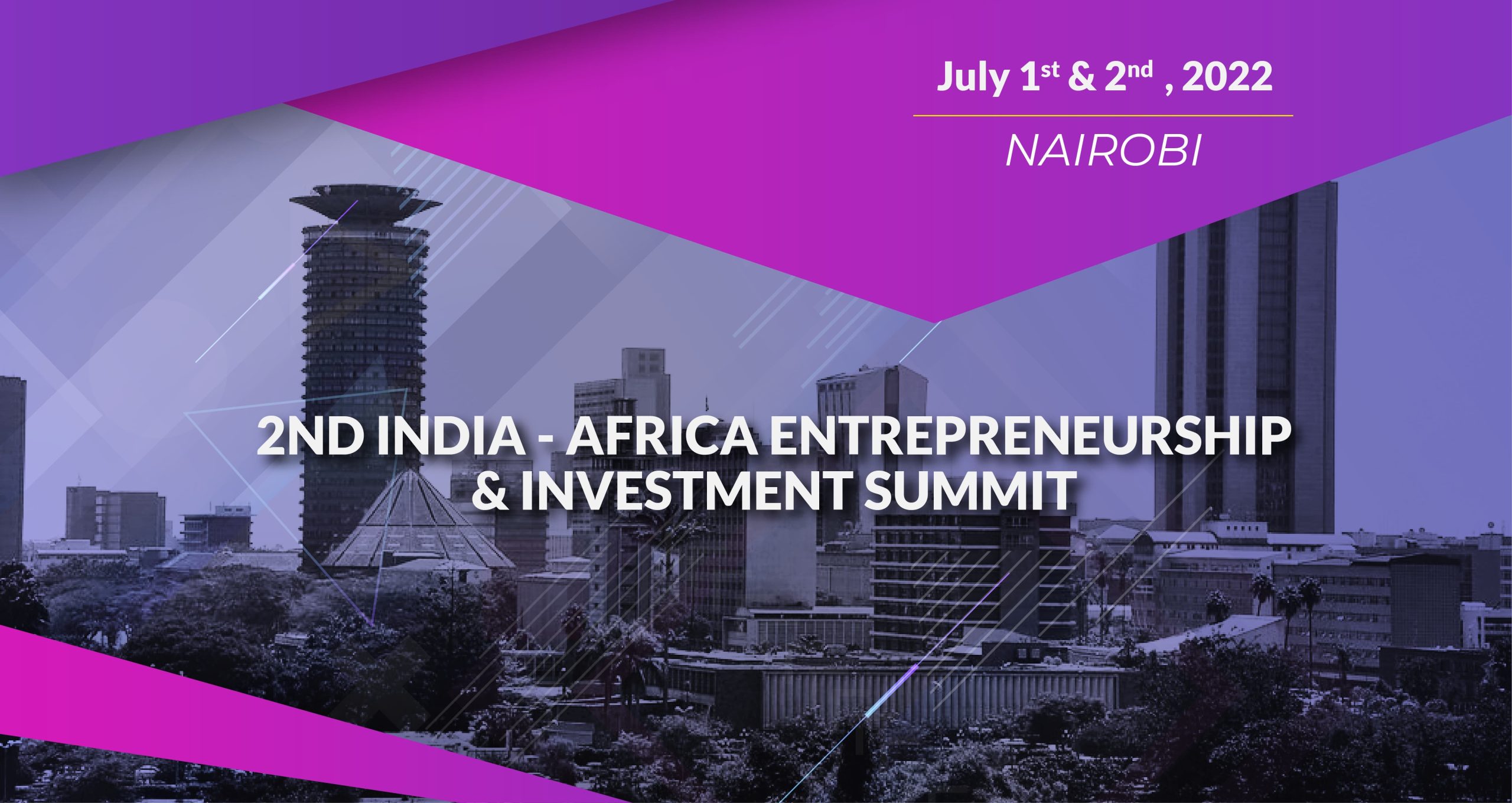
Late last week, stakeholders, leaders, thinkers and builders from across Africa and India gathered at the Sarova Panafric Hotel in Nairobi, Kenya, with intentions to create a mutually shared and valuable tech economy.
On July 1st and 2nd, it was business as usual at the second edition of the India-Africa Entrepreneurship Forum (IAEF), as dignitaries from diverse backgrounds came under one roof for a singular purpose: bridging the startup ecosystems of India and Africa.
Under the auspices of Mauritius (a crucial intersection jurisdiction between both regions), the India-Africa Entrepreneurship Forum sought to forge and grow collaborative relationships between members of the startup ecosystem in a way that results in mutual learning, international ventures, new business development, and the end goal of creating ever-deepening ties between the startup communities.
The event kicked off with keynote speeches from Issa Soormally, Vice Chairman Economic Development Board (ECB): Mauritius As a Hub for Doing Business and a representative of Honorable Betty C. Maina the Cabinet Secretary of Mauritius’ Ministry for Industrialization, Trade & Enterprise Development.
During these addresses, Kenya’s role in India-Africa relations was re-acclaimed extolled, particularly on the backs of the country being home to one of Africa’s most matured tech wetlands.
The IAEF’s highest points are panel discussions, where influential individuals shared ideas, analyzed norms and suggested solutions to some pressing problems.
Roundtable: Financing The Startup Ecosystem – The Mauritius International Financial Center & The Mauritius Africa Fund with Yash Manick CEO Mauritius Africa Fund, Santosh Gujadhur MD, Apex Management Group, and Priscilla Balgobin Bhoyrul of Dentons Mauritius.
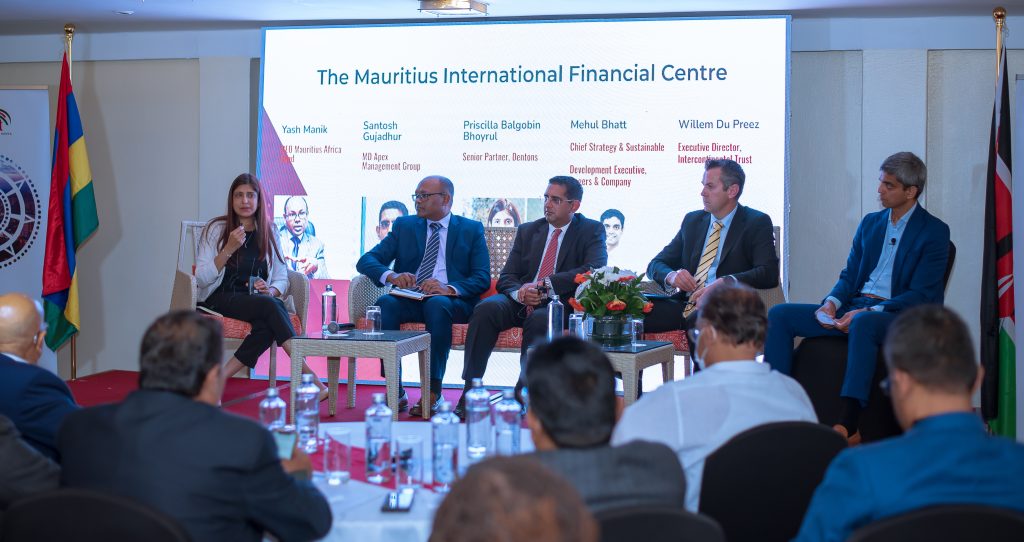
Mauritius is Africa’s most preferred destination for startup investments, playing home to the holding companies (holdcos) of some of the continent’s best-known and most promising tech companies.
Nevertheless, investments flow “through Mauritius” into other parts of Africa rather than being a retainer. These two Mauritian organizations disscussed the country’s efforts towards accelerating African startup investments.
Built on the three pillars of cross-border investments, cross-border corporate/private banking and wealth management, the Mauritius International Financial Center has a mandate to establish collaborations and co-investments to catalyze economic developments.
The Center, which has a solid count of global players as partners, pointed to financial services, retail, logistics, and tourism as the most promising sectors in Mauritius. The Center also divulged it is setting up a private equity outfit for Africa under government-to-government frameworks.
“Around USD 80 M of investment from Mauritius that goes to Africa, with Nigeria, Ghana, South Africa and Kenya as the top destinations,” said Jaya Doomun, Manager, Economic Development Board, Mauritius.
Roundtable: FinTech As Engine Of Economic Growth – A New Development Paradigm with Akshay Grover CEO Cellulant, Vikram Lodha Co-Founder 360tf, and Zak Nason-Giwa Founder of Good Loans.
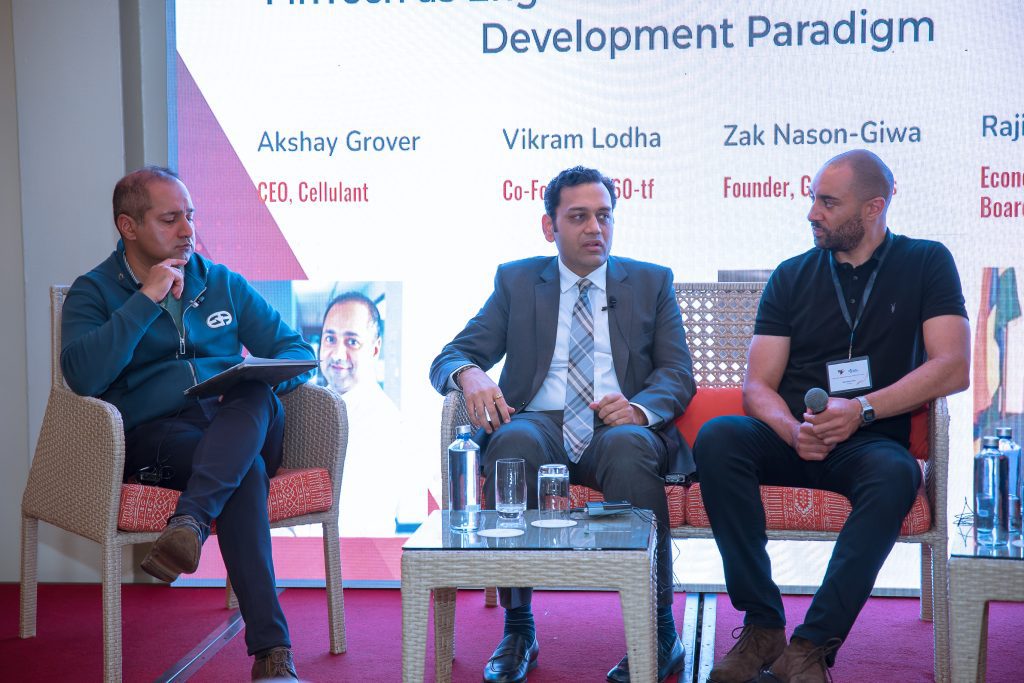
International investments have opened the global economy to many immense avenues to create value. Entrepreneurs in the agritech, healthtech and media industries took the stage sharing their success stories and most important learning points.
Panelists insisted on creating relationships between banks and fintech startups, as both verticals need to work together for innovation in the financial industry. Though they recognized that the trust factor is the primary setback for fintechs, they agreed on collaboration being the best way to garner appeal from the consumer market.
Collaboration happens when fintech empower the local shareholders, including banks to leverage on existing technology for more innovation. Along this line, the panel alluded to the various financial regulations obtainable in the Mauritian bubble, including licenses for peer-to-peer, virtual asset, crowdfunding and custodian services.
Fintechs will not change the fundamentals of the paradigm, instead they will improve and provide new ways of doing things,” said Akshay Grover, Cellulant CEO.
Roundtable: Investing in Under-Invested Opportunities For Outsized Returns with Hema Vallabh, General Partner, Five35 Ventures, Aysha Tegally, and Steven Friedmutter.
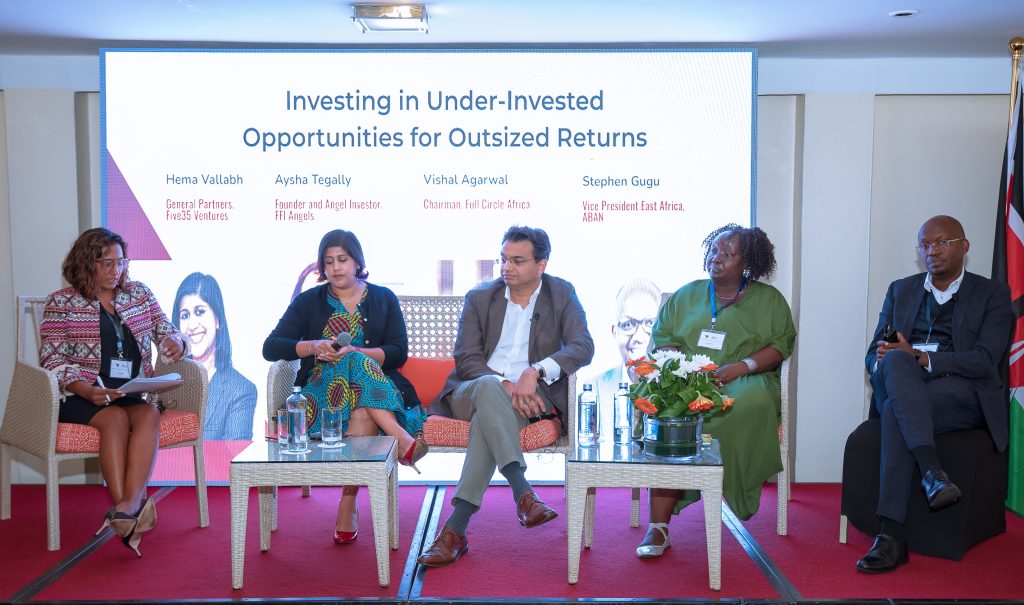
Africa currently carries the highest female entrepreneurship rate globally at 27 percent, and 58 percent of the continent’s self-employed population are women. Yet, only 3 percent of all the investments made into African startups between 2013 and 2021 went to female-led startups.
After shedding light on the challenges faced by African women in tech, the panel focused on exposing the overarching problem that is “unconscious bias” towards female entrepreneurs in the continent.
Citing the need for more women in venture capital and angel investing, the panelists supported the motion which says investing in women-led ventures ought to be regarded as more than charity case or side show. Investing in women should be an entirely focused and mandated endeavor.
As a major way of democratizing the investment space for women, the panel banged hard on the need to lower the barriers and become more intentional about backing women in tech.
“Investing in women should stop being looked at as a social impact. It’s not charity. Investing in women needs to be full-focused. It shouldn’t be aspirational, it should be mandated,”said Hema Vallabh of Five35 Venture.
Roundtable: Prominent Cross Border Investments – Opportunities & Challenges with Sandeep Khapre BDO and Andrew Mugambi (Partner, Dentons Hamilton Harrison & Mathews, Kenya), Wycliffe Mukangai Ingoi (Director, UPL), Moezz Mir (CEO, SBM Bank Kenya), Aman Bhasin (CFO, and Astral Aviation).
Roundtable: Fundraising in Turbulent Times with Arun Mathur (Director and former CEO I&M Bank), Rajat Tandon (President, Indian Venture & Alternate Capital Association), Anirudh Damani (CEO, Arth Venture Fund), Sam Badoo (Founder, Fleri), and Kartik Sharma, Head of Investments, Launch Africa VC.
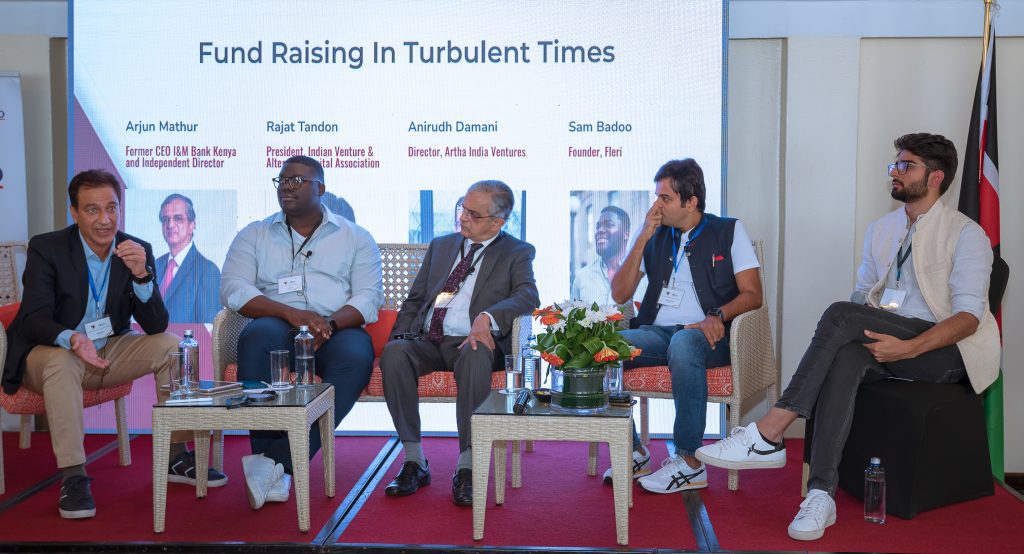
Roundtable 6: Igniting the India Africa Startup Ecosystem with Rahul Sharma (CEO, Apco Global India) alongside Padmaja Ruparel (CEO, Indian Angel Network), Darshan Chandaria (Founder, Chandaria Capital), and Marie Nielsen (Partner – Antler East Africa)
“My advice to young startups is that they should not go on to raise equity funding if you do not need it,” Padmaja Ruparel mentioned.
The second day kicked off with addresses from Baljinder Sharma, Convener of IAEF, Joe Machiru – Cabinet Secretary for ICT and Youth Affairs, Gov’t of Kenya (TBC), and Vimal Shah, Founder & Chairman, BIDCO.
“When it comes to executing ideas, timing is important. Just because the timing is not right it doesn’t mean the idea is not right, Vimal Shah said during his keynote.
Roundtable: Corporate Venture Capital – Investment for Market Access & Expansion with Ajay Ramasubramaniam, CEO Hindsight of Ventures, Mehul Bhatt, CEO of Velogic, Chirag Savla, Country Manager for Godrej Kenya, and Craig McLeod, CEO of Box Commerce.
A venture’s capacity to realize value through innovation separates success from failure. With corporate venture capital (CVC), is an easy and viable way for newer business models and emerging technologies to enter the path through which they reap the rewards of strategy and investments.
With many young promising startups, there is no better time than now to consider/expand CVC investments in Africa.
Roundtable: African Safari – Success Stories of Prominent Indian Entrepreneurs with Rishabh Lawania, Founder Badili Africa, engaged Ramesh Awtaney, Founder of ISON group, Kamal Budhabhatti (Founder & CEO, Little App & Craft Silicon), Deepankar Rustagi Co-founder Omnibiz Africa, and Rahul Jain of CEO Peach Payments.
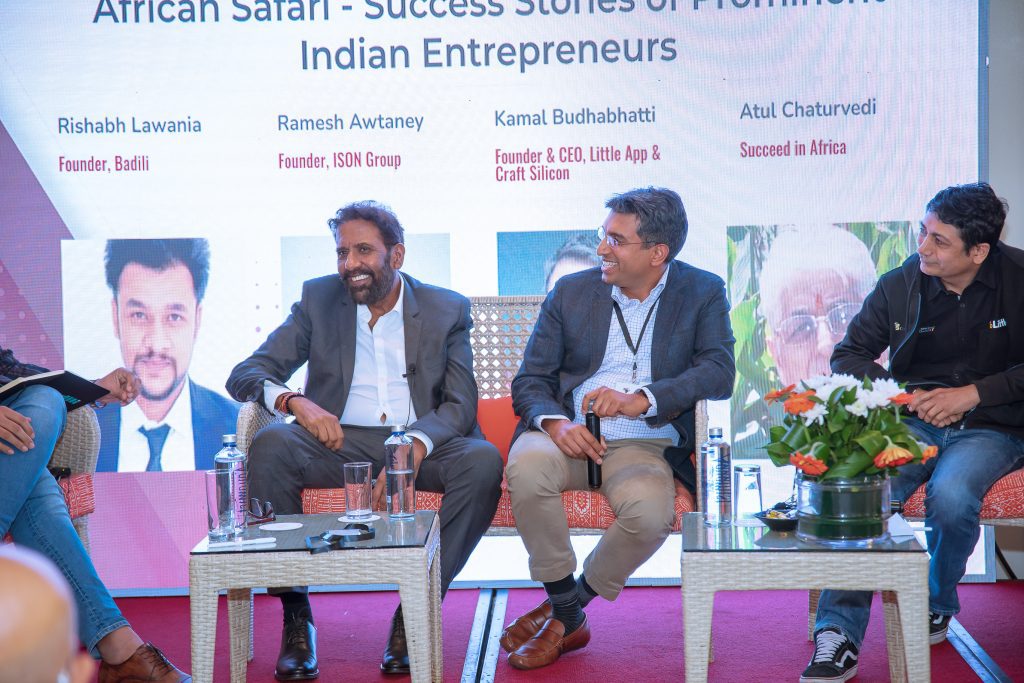
Over the years, some Indian nationals have moved to Africa in search of venture opportunities. Thankfully, a number of them, despite the hurdles that exist in-between, have been able to build promising and valuable businesses on the continent. This panel discussed some Indian entrepreneurs’ accomplishments in the continent.
“The service industry in Africa has not yet been given the attention it deserves,” said Ramesh Awtaney.
The panel, generally, is united in laying emphasis on the premises that the African continent is one of the best places in the world to to do business. They pointed out that, contrary to unpopular opinion, the continent is quite welcoming and favorable for business.
Fireside Conversation: Adventure Capitalism with Pradeep Gupta on the TiE Global, ABAN and IAN E2E Connection with Padmaja Ruparel and Stephen Gugu of Viktoria Ventures.
When it comes to investing in Africa, at its current stage, there is a demand for investors with high tolerance for risk. Being that the continent’s nascent digital economy is rich with long-term opportunities, adventure venture capitalists are more often than not best suited to invest in the region
“Statistics in Kenya show that only 10 percent of investments in the country go to local founders. A major way of tackling this challenge is creating local angel networks investing in homegrown startups,” Stephen Gugu said.
Roundtable: Smart Infrastructure for Smart Societies with [moderator] Paritosh Gupta, CEO, Kukuza Project Development Company, Maj. General Pavan Anand, Sanjay Salil, Subhashish Mazumdar & Mr Aditya Rao.
With a smart digital infrastructure, it is possible to increase the understanding and control of operations while optimizing the use of limited resources in a city. In the African context, digital-forward settlements are necessary to help the market catch up with the 4th industrial revolution.
“Kenya, for instance, has gained a reputation as one of the oldest and most thriving innovative ecosystems. The country accounts for 25 percent of Africa’s agritech startups. High internet penetration rate, fast internet speed and the use of English as a national language has given Kenya considerable advantage”.
The IAEF apexed when startups from India and Africa took to the stage, networking pitching their digital products and business models to investors.